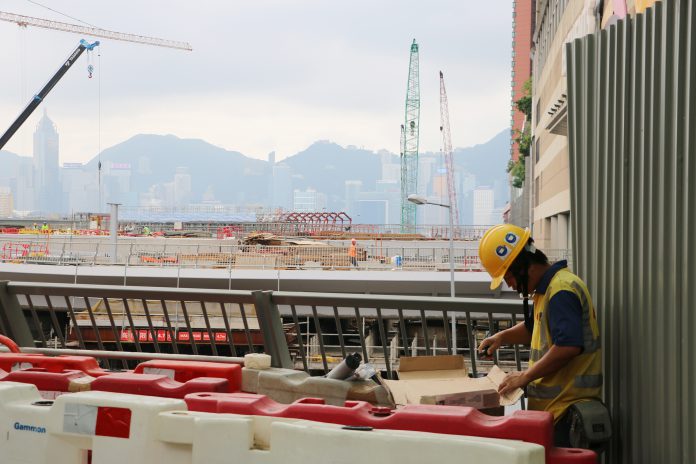Employers accused of hiding industrial accidents to avoid compensation
By Selena Chan & Yi Yeung
Ah Fei (not his real name), 54, was working on an elevator construction project on a flyover when he lost his balance while avoiding a falling board with nails sticking out of it. He fell to the ground and felt a searing pain in his pelvis.
The accident in June was just one of many that take place on Hong Kong construction sites every year. Last year, there were 35,768 industrial accidents overall and 3,720 in the construction industry, which was a drop of 0.2 per cent and 0.1 per cent respectively from 2015.
But while the number of reported accidents dropped slightly, the number of fatalities in the construction industry – which already has the highest rate of work-related deaths – has gone up. As of August 8, the number of recorded fatalities in the construction industry was 14, exceeding the total number of 10 in the previous year.
Ah Fei sat in agony on the ground for half an hour. But he had been instructed to never call an ambulance in the event of an accident in the company’s safety training course. He called his supervisor, who drove him to the hospital himself.
Ah Fei stayed in hospital for three days and during this time, the safety officer from his construction site took down an oral statement. He assured Ah Fei the company had reported his injury to the Labour Department. But when he checked a month later, Ah Fei found no record of it.

Although Ah Fei insisted on filing the incident as a work injury with the Labour Department, the contractor reported it as a contested employees’ compensation case. By refusing to acknowledge accidents as work injuries, employers can avoid paying the injured workers compensation.
Ah Fei’s employer issued him four-fifths of his monthly income, along with a loan receipt, which states that if the Labour Department investigation eventually rules the incident is not a work injury, he has to return the money with interest. As the sole breadwinner in his family, Ah Fei could only sign the receipt and accept the money. “This is so unfair to us as injured workers,” he says.
Ghale Surendra Man, 42, is a Nepalese cladding worker who moved to Hong Kong in 2007. His late brother-in-law, Gurung Chitra Bahadur, who was 51, worked on the Hong Kong-Macau-Zhuhai Bridge construction as a carpenter. Ghale says that on February 8 this year Gurung went to work as normal in the morning. But at around 6pm, he fainted while he was changing his clothes.
He was driven to the North Lantau Hospital in Tung Chung in a company car and remained unconscious until he died on March 27. Ghale says he believes the company did not call an ambulance because it wanted to avoid reporting the incident.
He thinks this caused a delay in Gurung’s treatment. “The problem was related with the brain, the oxygen, the blood circulation. They [the employer] should call immediately the ambulance. If the ambulance came, there should be oxygen, so they can treat him immediately, and give him the oxygen,” he says.
Ghale adds there were other Nepalese workers on the construction site at the time, but none of them did anything to save Gurung. He suspects they were worried they would lose their jobs if they intervened.
Alvin Yau Chi-hang, programme officer of the Catholic Diocese of HK Diocesan Pastoral Centre for Workers says it is common to find cases where employers avoid reporting work injuries to the Labour Department. He says their motives are to hide the incidents to avoid making big compensation payments and to protect their reputations.
The Labour Department requires employers to report any work injury within 14 days and any deaths on the job within seven days. Yau says some employers will ask the injured worker to take sick leave and not report the incident. When the worker discovers the employer has not reported the accident, the employers may try to convince them that the procedures are very complicated, and dissuade them from filing a report to the Labour Department. Since workers are usually in urgent need of money, they can only accept what their employers offer them as a settlement.
Yau says workers are vulnerable because of their limited knowledge of the compensation mechanism and regulations. They are unaware of their own rights. Labour regulations are rarely mentioned in mainstream education and workers are not taught about them on the job. This makes it easy for employers to take advantage of them and offer smaller settlements.
What is more, the existing labour regulations are stacked in favour of employers and Yau says the Labour Department is relatively powerless. He points out that when employers refuse to acknowledge work injuries, all the Labour Department can do is launch an investigation and tell the employer they “suspect” there is a case of work injury. In the meantime, employers can suspend payments for salary, medical fees, or compensation.
Under the current regulations, any employer who fails to give notice of an accident to the Commissioner for Labour is liable to a maximum fine of $50,000. The Labour Department does not have a figure for the average fine handed out for the offence, but its statistics show the average fine per summons arising from industrial accidents was only around HK$12,000 to HK$17,000 from 2014 to 2016.
“Ten thousand means very little to employers. If they hold back on reporting one case, they could save a million dollars [in compensation],” says Yau.
It is unlikely the regulations will be changed in workers’ favour given that functional constituencies, many of which are pro-business, make up half of the Legislative Council. “The government is obviously pleasing those from the business sector and employers,” Yau says.
That is bad news for Ho Wai-ip. Ho, 42, worked as a baggage handler at the Hong Kong International Airport for five years before he suffered spinal disc herniation two years ago. He has been on sick leave since then.
He says his workplace was always short-staffed and he often worked at least 100 hours of overtime each month. When the accident happened, Ho was unloading luggage from one aircraft by himself. He strained his back and found it hard to stand properly or move.
According to the Employees’ Compensation Ordinance, employees’ compensation claims involve three stages. First, the injured worker is paid four-fifths of their monthly earnings at the time of the accident for the period of their temporary incapacity. Secondly, they can claim the full amount of their medical expenses. And finally, they receive compensation according to the Certificate of Compensation Assessment issued by the Labour Department. In Ho’s case, the first two have been settled, but the Assessment of Permanent Loss of Earning Capacity carried out in December 2016 determined Ho had only lost 1 per cent of his earning capacity.
“The 1 per cent says nothing about my pain and injury,” says Ho. Two years after the accident and numerous treatments, he still feels the pain and cannot sit still. He says the months he spent at home and unable to work, relying on his wife’s income and financial support from his family were a kind of mental torture. He has to bear all the medical fees incurred after the Assessment of Permanent Loss of Earning Capacity result was issued, and he cannot afford the cost of physiotherapy.
Apart from injured workers, family members of victims who die in industrial accidents also face difficulties claiming compensation. There have been nine recorded fatalities and over 200 cases of injury since construction on the Hong Kong-Zhuhai-Macau Bridge began in 2009. Tse To-hung’s younger brother, Tse To-long, was a surveyor on the project and fell from a 15m elevated work platform three years ago. Even now, Tse still cannot get a death certificate for his brother.
In cases of unnatural death, the Coroner usually takes at most 24 months to determine the cause of death. But the cause of Tse To-long’s death is still under investigation. Tse To-hung says without a death certificate, he cannot handle his brother’s bank accounts and probate. “For our family, all we need is a death certificate, then we can close the file,” says Tse. “But at this moment, we can do nothing but wait,” he adds.
Apart from the waiting, what frustrates Tse most is the inefficient coordination between different government departments, their slow responses and lack of communication. Tse was annoyed that the Labour Department did not even bother to notify him when it decided to sue his brother’s employer.
With his brother’s case currently locked in a court battle between the Labour Department and his brother’s company, Tse has no idea when he will finally get an answer on what happened to his brother. “My father is already 80. If this drags on for a few more years I’m not even sure if he’d still be here,” he says.

“My brother’s case is definitely not the last accident of the bridge construction project and there are a lot more coming,” says Tse. He urges the government and contractors to put more effort into monitoring safety and preventing more accidents from happening.
According to Michael Luk Chung-hung, a legislator for the Labour Functional Constituency, officials estimate that around 70 per cent of industrial accidents are the result of workers’ lack of safety awareness and failure to follow safety regulations. However, he thinks there should be changes made to ensure workers’ safety. “At the end of the day what’s most important is to see legal changes, harsher punishments in fines and jail terms,” Luk says.
He suggests a points deduction system where contractors would lose points as a result of misconduct. The deduction of points would affect their chances of landing bids for construction projects in the future. Luk says this would have a deterrent effect on contractors.
Luk also questions the independence of safety officers on construction projects. They are responsible for monitoring the safety measures and standards on site but are directly hired by the contractors, this creates potential conflicts of interest. Luk suggests an independent body should be set up to recruit safety officers instead.
Chan Kam-hong, chief executive of the Association for the Rights of Industrial Accident Victims, has been advocating for injured workers for decades. He says the existing punishments fail to reflect the seriousness of industrial accidents. Not a single employer has been sent to jail as a result of an industrial accident so far.
Chan says it is “a crime,” to allow industrial accidents to happen. He believes developers hold the key to preventing industrial accidents as they control the timeframe and methods used for construction.
Chan outlines three things the government should do to reduce the number of accidents: promote safety education, raise safety standards and mete out harsher punishments on employers. “What the government has done to the workers who were sacrificed in the construction of Hong Kong is unforgivable. It is condoning those who’re breaking the law,” he says.

For Chan, employers are being given a free pass, few are willing to speak up for workers and people seldom blame the bosses where there is an accident. He says that while the government requires workers to follow safety measures, “they never dare to say that protecting workers is the employers’ responsibility.”
He has been delivering the message for more than 20 years but Chan laments that “things remain the same.”
“And if we don’t work towards heavier punishment, safety education and higher safety measures, I believe everything will still remain the same 20 years later.”
Edited by Jessica Li










































